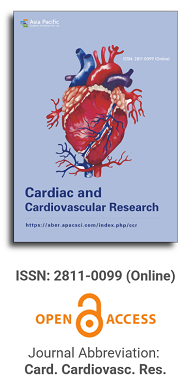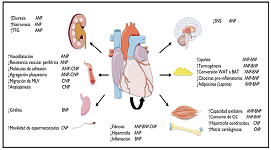
Asia Pacific Academy of Science Pte. Ltd. (APACSCI) specializes in international journal publishing. APACSCI adopts the open access publishing model and provides an important communication bridge for academic groups whose interest fields include engineering, technology, medicine, computer, mathematics, agriculture and forestry, and environment.

Research progress on the relationship between testosterone and cardiovascular disease
Vol 1, Issue 1, 2020
Download PDF
Abstract
Testosterone is the main androgen in human body and has many important effects on cardiovascular system Testosterone deficiency is common in patients with cardiovascular diseases. Many data suggest that low serum testosterone level is related to cardiovascular diseases such as coronary heart disease, heart failure and arrhythmiahowever, the mechanism involved is not completely clearin recent years, the research on testosterone and cardiovascular diseases has attracted much attention. This paper summarizes the pathogenesis and influence of testosterone related cardiovascular diseases.
Keywords
References
- Brant L, Ribeiro A. Cardiovascular health: a global primordial need. Heart. 2017; 104(15): 312562–312563.
- Morris PD, Channer KS. Testosterone and cardiovascular disease in men. Asian Journal of Andrology. 2012; 14(3): 428.
- Elagizi A, Khler TS, Lavie CJ. Testosterone and cardiovascular health. Mayo Clinic Proceedings. 2018; 93(1): 83–100.
- Hackett G, Kirby M. Erectile dysfunction and testosterone deficiency as cardiovascular risk factors? International Journal of Clinical Practice. 2018; 72(2): 12275–13054.
- Morgentaler A, Zitzmann M, Traish AM, et al. Fundamental concepts regarding testosterone deficiency and treatment: International expert consensus resolutions. Journal of Urology. 2016; 196(6): 1722.
- Gururani K, Jose J, George PV. Testosterone as a marker of coronary artery disease severity in middle aged males. Indian Heart Journal. 2016; 68 Suppl 3(S3): S16.
- Corona G, Rastrelli G, Pasquale GD, et al. Testosterone and cardiovascular risk: Meta-Analysis of interventional studies. Journal of Sexual Medicine. 2018; 15(6): 820–838.
- Griebling TL. Re: Effects of testosterone treatment in older men. Journal of Urology. 2017; 197(2): 494.
- Shores MM, Matsumoto AM. Testosterone, aging and survival: Biomarker or deficiency. Curr Opin Endocrinol Diabetes Obes. 2014; 21(3): 209–216.
- Herring MJ, Oskui PM, Hale SL, et al. Testosterone and the cardiovascular system: A comprehensive review of the basic science literature. J Am Heart Assoc. 2013; 2(6): e000271.
- Zarotsky V, Huang MY, Carman W, et al. Systematic literature review of the epidemiology of nongenetic forms of hypogonadism in adult males. Journal of Hormones. 2014; 2014(1): 117.
- Yoshihisa A, Suzuki S, Sato Y, et al. Relation of testosterone levels to mortality in men with heart failure. American Journal of Cardiology. 2018; 121(11): 1279–1448.
- Malkin CJ, Pugh PJ, Morris PD, et al. Low serum testosterone and increased mortality in men with coronary heart disease. Heart. 2010; 96(22): 1821-1825.
- Seftel AD, Land S. Testosterone and cardiovascular disease. Lancet Diabetes & Endocrinology. 2016; 67(5): 545.
- Kloner RA, Carson C, Dobs A, et al. Testosterone and cardiovascular disease. Am Coll Cardiol. 2016; 67(5): 545–557.
- Kelly DM, Jones TH. Testosterone and cardiovascular risk in men. Frontiers of Hormone Research. 2014; 43(43): 1.
- Tambo A, Roshan MHK, Pace NP. Testosterone and cardiovascular disease. Open Cardiovascular Medi-cine Journal. 2016; 10(1): 110.
- Armstrong PW, Ezekowitz JA. Testosterone therapy in women with heart failure. Am Coll Cardiol. 2010; 56(16): 1317–1319.
- Toma M, Mcalister FA, Coglianese EE, et al. Testosterone supplementation in heart failure: a meta-analysis. Circulation Heart Failure. 2012; 5(3): 315-321.
- Aukrust P, Ueland T, Gullestad L, et al. Testosterone: a novel therapeutic approach in chronic heart failure? Journal of the American College of Cardiology. 2009; 54(10): 928–929.
- Morgentaler A, Miner M M, Caliber M, et al. Testosterone therapy and cardiovascular risk: advances and controversies. Mayo Clinic Proceedings. 2015; 90(2): 224–251.
- Chrysant SG, Chrysant GS. Cardiovascular benefits and risks of testosterone replacement therapy in older men with low testosterone. Hospital Practice. 2018; 46(4): 244–253.
- Seftel AD. Re: testosterone treatment and coronary artery plaque volume in older men with low testoster-one. Journal of Urology. 2017; 198(4): 727.
- Giovanni CG, Giulia R, Elisa M, et al. Testosterone replacement therapy and cardiovascular risk: A review. World Journal of Mens Health. 2015; 33(3): 130–142.
- Mathur A, Malkin C, Saeed B, et al. Long-term benefits of testosterone replacement therapy on angina threshold and atheroma in men. European Journal of Endo-crinology. 2009; 161(3): 443–449.
- Zhao D, Guallar E, Ouyang P, et al. Endogenous Sex Hormones and Incident Cardiovascular Disease in PostMenopausal Women. Journal of the American Col-lege of Cardiology. 2018; 71(22): 2555–2566.
- Rexrode M, Manson JAE, Lee I, et al. Sex Hormone Levels and Risk of Cardiovascular Events in Postmenopausal Women. Circulation. 2003; 108(14): 1688.
- Meun C, Franco OH, Dhana K, et al. High androgens in postmenopausal women and the risk for atherosclerosis and cardiovascular disease: The Rotterdam Study. J Clin Endocrinol Metab. 2018; 103(4): 1622–1630.
- Rosano GMC, Spoletini I, Vitale C. Cardiovascular disease in women, is it different to men? The role of sex hormones. Climacteric. 2017; 20(2): 125–128.
- Jones TH, Kelly DM. Randomized controlled trials-mechanistic studies of testosterone and the cardiovascular system. Asian Journal of Andrology. 2018; (2): 120–130.
- Niccoli G, Milardi D, DAmario D, et al. Hypotestosteronemia is frequent in ST-elevation myocardial infarction patients and is associated with coronary microvascular obstruction. European Journal of Preventive Cardiology. 2015; 22(7): 855–863.
- Deenadayalu V, Puttabyatappa Y, Liu AT, et al. Testosterone-induced relaxation of coronary arteries: activa-tion of BKCa channels via the cGMP-dependent protein kinase. Am J Physiol Heart Circ Physiol. 2012; 302(1): H115–H123.
- Herring MJ, Hale SL, Shi J, et al. Supraphysiological Testosterone Levels Shorten the QT Interval but do Not Alter Total Anatomic Myocardial Infarct Size in Rabbits with Acute Myocardial Infarction. Plant Biology. 2014; 16(3): 594–606.
- Budoff MJ, Ellenberg SS, Lewis CE, et al. Testoster-one treatment and coronary artery plaque volume in older men with low testosterone. Jama. 2017; 317(7): 708.
- Kelly DM, Nettleship JE, Akhtar S, et al. Testosterone suppresses the expression of regulatory enzymes of fatty acid synthesis and protects against hepatic steatosis in cholesterol-fed androgen deficient mice. Life Sciences. 2014; 109(2): 95–103.
- Kilby E, Jones H. Testosterone stimulates cholesterol efflux and metabolism in human macrophages via liver X receptor. Endocrine. 2013; 109(2): 95–103.
- Stanworth RD, Kapoor D, Channer KS, et al. Dyslipidaemia is associated with testosterone, oestradiol and androgen receptor CAG repeat polymorphism in men with type 2 diabetes. Clinical Endocrinology. 2011; 74(5): 62–430.
- Kelly DM, Sellers DJ, Woodroofe MN, et al. Effect of testosterone on inflammatory markers in the development of early atherogenesis in the testicular-feminized mouse model. Endocrine Research. 2013; 38(3): 125–138.
- Bourghardt J, Wilhelmson AK, Alexanderson C, et al. Androgen receptor-dependent and independent atheroprotection by testosterone in male mice. Endocrinology. 2010; 151(11): 5428–5437.
- Baillargeon J, Urban J, Ottenbacher KJ, et al. Trends in androgen prescribing in United States. Jama Internal Medicine. 2013; 173(15): 1465–1466.
- Khaw KT, Dowsett M, Folkerd E, et al. Endogenous testosterone and mortality due to all causes, cardiovascular disease, and cancer in men: European prospective investigation into cancer in Norfolk (EPIC-Norfolk) Prospective Population Study. Circulation. 2007; 116(23): 2694–2701.
- Morgentaler A. Testosterone deficiency and cardiovascular mortality. Asian Journal of Andrology. 2015; 17(1): 26–31.
- Araujo AB, Dixon JM, Suarez EA, et al. Clinical review: Endogenous testosterone and mortality in men: a systematic review and meta-analysis. J Clin Endocrinol Metab. 2011; 96(10): 3007–3019.
- Hu X, Rui L, Zhu T, et al. Low testosterone level in middle-aged male patients with coronary artery disease. European Journal of Internal Medicine. 2011; 22 (6): e133.
- Muraleedharan V, Marsh H, Kapoor D, et al. Testosterone deficiency is associated with increased risk of mortality and testosterone replacement improves survival in men with type 2 diabetes. European Journal of Endocrinology. 2013; 169(6): 725–733.
- Shores MM, Smith NL, Forsberg CW, et al. Testosterone treatment and mortality in men with low testosterone levels. J Clin Endocrinol Metab. 2012; 97(6): 2050–2058.
- Ruige JB, Mahmoud AM, Bacquer DD, et al. Endogenous testosterone and cardiovascular disease in healthy men: a meta-analysis. Heart. 2011; 97(11): 870.
- Corona G, Rastrelli G, Monami M, et al. Hypogonadism as a risk factor for cardiovascular mortality in men: a meta-analytic study. European Journal of Endocrinology. 2011; 165(5): 687–701.
- Goodale T, Sadhu A, Petak S, et al. Testosterone and the Heart. Methodist Debakey Cardiovascular Journal. 2017; 13(2): 68.
- Zhang Y, Ouyang P, Post WS, et al. Sex-Steroid hormones and electrocardiographic qt-interval duration: findings from the third national health and nutrition examination survey and the multi-ethnic study of atherosclerosis. American Journal of Epidemiology. 2011; 174(12): 403-411.
- Morita H, Wu J, Zipes DP. The QT syndromes: long and short. Lancet. 2008; 372(9640): 750–763.
- Charbit B, Christinmatre S, Démolis JL, et al. Effects of testosterone on ventricular repolarization in hypogonadic men. American Journal of Cardiology. 2009; 103(6): 887–890.
- Masuda K, Takanari H, Morishima M, et al. Testosterone-mediated upregulation of delayed rectifier potassium channel in cardiomyocytes causes abbreviation of QT intervals in rats. Journal of Physiological Sciences. 2018; 69(2): 335–343.
- Lubart E, Yarovoy A, Gal G, et al. QT interval length in elderly prostatic cancer patients on anti-testosterone treatment. Israel Medical Association Journal Imaj. 2015; 17(6): 356–359.
- Noord CV, Dörr M, Sturkenboom MCJM, et al. The association of serum testosterone levels and ventricular repolarization. European Journal of Epidemiology. 2010; 25(1): 21–28.
- Kurokawa J, Furukawa T. Non-genomic action of sex steroid hormones and cardiac repolarization. Biological & Pharmaceutical Bulletin. 2013; 36(1): 812.
- Schwartz JB, Volterrani M, Caminiti G, et al. Effects of testosterone on the Q-T Interval in older men and older women with chronic heart failure. International Journal of Andrology. 2011; 34(5 Pt 2): e415.
Supporting Agencies
Copyright (c) 2020 Long Xie, Jiandi Liu, Dongming Xie

This work is licensed under a Creative Commons Attribution 4.0 International License.

This site is licensed under a Creative Commons Attribution 4.0 International License (CC BY 4.0).

Prof. Prakash Deedwania
University of California,
San Francisco, United States




